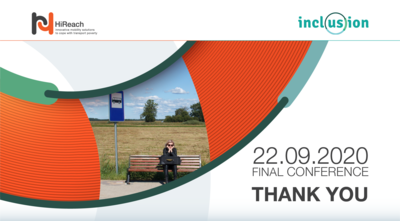
The INCLUSION and HiReach projects teamed up to organise a final joint virtual conference titled “Inclusive mobility for an inclusive society: new approaches and solutions. How can transport benefit us all?”
The event lasted three hours and was moderated by Karen Vancluysen, POLIS Secretary General. The event was made up of two parts. While the first part looked at challenges and issues related to transport poverty and accessibility; the second part provided the participants with tools, methods, and solutions to design a more inclusive mobility system for all, and in particular, for vulnerable-to-exclusion people living in urban, peri-urban, rural and remote areas.
The INCLUSION and HiReach projects teamed up to organise a final joint virtual conference titled “Inclusive mobility for an inclusive society: new approaches and solutions. How can transport benefit us all?”
The event lasted three hours and was moderated by Karen Vancluysen, POLIS Secretary General. The event was made of two parts. While the first part looked at challenges and issues related to transport poverty and accessibility, the second part provided the participants with tools, methods, and solutions to design a more inclusive mobility system for all, and in particular, for vulnerable-to-exclusion people living in urban, peri-urban, rural and remote areas.
Both projects recommended that successful solutions work best when extensive demand analysis and user requirements are taken into account. Users need to be involved in co-designing the solutions that add value and are effective in responding to complexity of their specific needs. Building partnerships with local champions and providing one-to-one support from community organisations prove essential to create higher user awareness and to target vulnerable users.
INCLUSION stressed the importance of understanding user needs in the planning and design stage. An ICT tool can only be successfully implemented if needs and skills of vulnerable users are comprehended; hence, assisting users to become familiar with new technology by working with Apps before adoption is key. Vulnerable users need pre-trip training to become acquainted with, or require assistance whilst travelling, in order to build up trust and confidence in using the technology, with the help of trained members of the community or professionals. For many users, social isolation must not be overlooked, and this makes the human element an important aspect from which to build trust. The public sector has a key role to play for financing, monitoring and ensuring quality and safety in terms of use of personal data. Through involvement and financing of public-private partnership the public sector can ensure the uptake of IT-solutions by targeted vulnerable groups, adding value from involvement of the private and community organisations.
HiReach stressed that without a transparent and clear inclusive mobility vision, a consistent set of solutions can rarely be achieved. Adoption of a bottom-up approach and integration of different mobility options, in addition to providing more open data on the use of business, is a key. HiReach demonstrates that innovative business models need to be developed to create an inclusive and successful set of business models for collective passenger transport.
Visit the Final conference page to download the agenda, all the presentations and watch again the recording of the webinar.